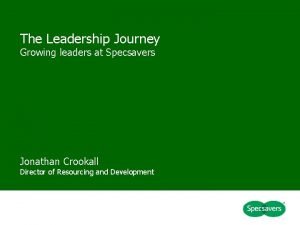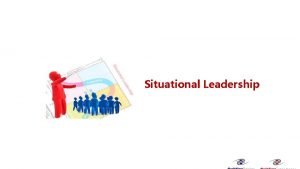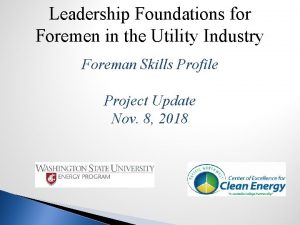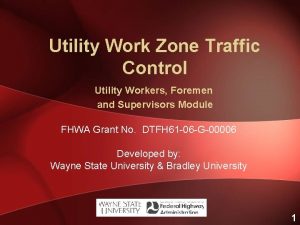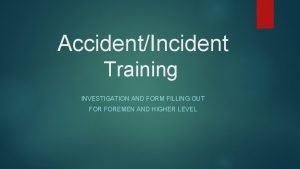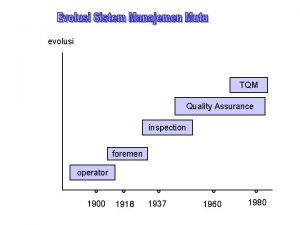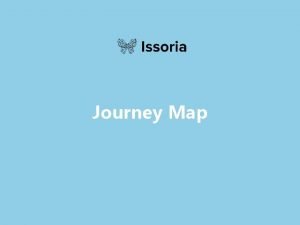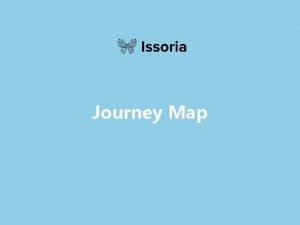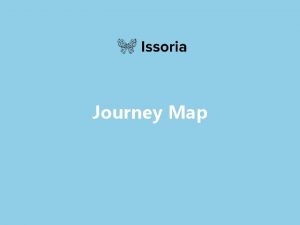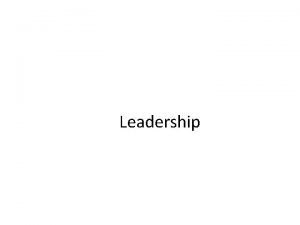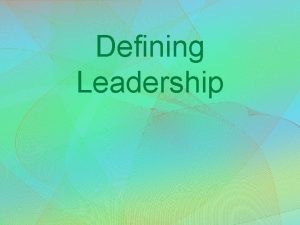Leadership Foundations for Journey Level Foremen in the












- Slides: 12

Leadership Foundations for Journey. Level Foremen in the Utility Industry Foreman Skills Profile Alan Hardcastle Senior Research Manager April 12, 2018

Underlying Need for Foremen Skill Profiles Moving skilled journey-level employees into leadership careers Leadership credibility rooted in craft experience Human behavior elements critical Work is highly knowledge-based Leadership skills are learned/earned: ◦ Technical skills ◦ People skills ◦ Management skills New technologies Changes in demographics and labor pool Continuous learning —training and retraining

Benefits of Energy Skill Profiles Communicate workplace expectations Verify critical work functions, activities, qualifications and skills Increase responsiveness of education, workforce programs, service providers, internal training Enhance employability and portability of skills Match programs and curriculum to workplace requirements (Relevance)

Why Foremen? Key leadership role—a high-value catalyst Most foremen ‘lead’ and ‘do’ simultaneously Team-based work requires group cohesion Adapting to new technologies and processes Knowledge and skill expectations changing Common challenge for Utilities Relevant to other industries, programs and certifications 4

What are Skill Profiles? Detailed summaries of the critical work functions, key activities, knowledge and skills required of occupations Defined through a facilitated, one-day focus group process Participants are employees in the job, and other subject matter experts from industry Used by education and industry trainers to identify program gaps, and to develop or improve curriculum, training, certifications and degrees

Building and Using Profiles 1. Background Research 2. Industry Focus Group 3. Draft Skill Profiles 4. Verify Draft or Revise 5. New Programs/Revisions

Research to Date ◦ Variety of leadership programs available (NWPPA, WEI, Colleges, etc. ) ◦ State, regional and federal resources ◦ Utility partners offer some training; both passive and OJT/mentorships ◦ May be different in every utility ◦ Industry changes- Leadership Competitiveness/Performance

Research to Date What we DON’T know or have: ◦ Recent analyses of foundational functions, activities, skill needs foremen ◦ Employer expectations and sense of urgency ◦ Transferability across sectors

Next Steps Project Timeline: ◦ Agreement on project (April 12) ◦ Recruit 8 -10 Focus Group Participants (ASAP) ◦ Focus Group Date (May 8 -10) ◦ Analyses and Draft Report (by early June) ◦ Final Report (June 15) ◦

Thank You!


Contact Alan Hardcastle 360 -956 -2167 Hardcast@wsu. edu
 Jonathan crookall
Jonathan crookall Transformational vs transformative leadership
Transformational vs transformative leadership What is adaptive leadership theory
What is adaptive leadership theory Adaptive leadership vs situational leadership
Adaptive leadership vs situational leadership Iso 22301 utbildning
Iso 22301 utbildning Typiska novell drag
Typiska novell drag Nationell inriktning för artificiell intelligens
Nationell inriktning för artificiell intelligens Returpilarna
Returpilarna Varför kallas perioden 1918-1939 för mellankrigstiden
Varför kallas perioden 1918-1939 för mellankrigstiden En lathund för arbete med kontinuitetshantering
En lathund för arbete med kontinuitetshantering Underlag för särskild löneskatt på pensionskostnader
Underlag för särskild löneskatt på pensionskostnader Personlig tidbok
Personlig tidbok A gastrica
A gastrica
